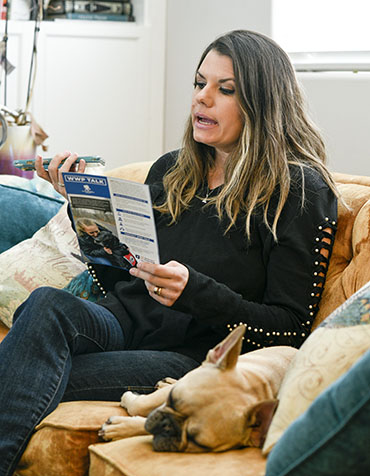How Financial Worries Can Affect Veterans' Mental Health

Wounded Warrior Project’s Holistic Approach to Veterans Care Helps Improve Overall Well-Being
It’s probably no surprise that worrying about finances can cause or increase stress, anxiety, and other mental health issues.
That could be especially true for veterans who may already be dealing with post-traumatic stress disorder (PTSD), depression, physical injuries, and a loss of connection after military service. Add financial woes to the mix, and it can be a slippery slope.
"If you are struggling to pay your bills or are receiving daily calls from bill collectors, it can be overwhelming and stressful," said Deborah Olvera, Financial Readiness manager for Wounded Warrior Project® (WWP). "The worry can affect your sleep, appetite, and mood. For warriors, it can lead to symptoms associated with PTSD, anxiety, or other mental health issues. Financial stressors also have a significant impact on relationships, which can make a warrior feel isolated and alone."
WWP’s Warrior Survey* shows that financial strain on warriors has increased since 2021. In 2022, more than 6 in 10 warriors (64%) reported that they did not have enough money to make ends meet at some point in the past 12 months.
People often avoid discussing money problems, but sharing financial trouble or concerns isn’t something to be embarrassed about. When it comes to WWP’s financial education program, there’s no judgment about a warrior’s financial situation, just a plan for a positive path forward.
“A lot of people are very private about their finances, and talking about it isn’t something they’re comfortable with,” Deborah said. “But talking about finances is one of those things we really should be doing.”
A Warrior’s Way Forward
Financial wellness was just one of the things warrior and U.S. Marine Philip Krabbe struggled with when he got out of the military. Philip was a platoon sergeant in the Marines. When a roadside bomb in Iraq killed two members of his platoon and an interpreter, Philip returned home with survivor’s guilt and other invisible wounds.

He tried to mask those feelings with alcohol and prescription drugs.
“I was using that to cope,” Philip said. “I was having nightmares every night. I was to the point where I was drinking, and I wouldn't get drunk. I started doing drugs to keep me awake at night, so I wouldn't have any nightmares. I would stay up for three or four days at a time. I was physically tired. I was mentally and emotionally tired.”
With everything else going on, working on a financial plan seemed irrelevant, but Philip knew it was time to do something different. He wanted to get sober and change his future.
In 2019, Philip found Wounded Warrior Project. His involvement with WWP helped guide him through tough times and the warriors Phillip met served as accountability partners in his sobriety.
Philip was making strides with his mental health; however, he wasn’t able to work while dealing with his recovery, and what he was making from VA disability wasn’t enough to cover his bills. He knew working on his mental health and staying sober was his priority, but the additional financial stress threatened his recovery at times.
“The first year of my recovery was the hardest,” he said. “Getting off [drugs] was one aspect of what I was fighting. And then to have to worry about where my next meal was coming from or how I was going to put food on the table for the next week for my family was another aspect. There were times when I thought, ‘Why am I doing this?’ I could easily just go back to the way it was, and I could deal with it as it comes. It was very hard.”
But Philip stayed on course, with WWP on his side. He received support from the Benefits Services team, which often works in conjunction with WWP’s financial wellness programs. The team helped Philip review his VA disability and increase his rating to 100%, which helped alleviate a lot of his financial concerns.
Easing the financial burdens weighing Philip down helped him concentrate on his recovery full-time. “It was a life-changer,” Phillip said. “I am very thankful to Wounded Warrior Project for getting behind me and investing in my recovery. Because I didn't do it alone.”
Why Budgeting Can Be Key
When it comes to financial wellness, Deborah said one of the most important things someone can do is create a budget and figure out what they have to spend. The financial education program helps establish whether financial issues are related to money management or insufficient income.
“It doesn't matter if you are making a lot of money or you're making little money, you should always have a budget, because that's going to really give you peace of mind,” Deborah said.
WWP’s financial education program can help with individualized budget planning, saving, and debt management, and help maintain support for warriors as they work to improve their financial situation.
“One of the responses that we often hear from warriors is that having a plan made them feel 100 times better,” Deborah said. “Just knowing that they're working on doing something about it helps remove some of the burden off their shoulders.”
Healing the Whole Warrior
As in Philip’s case, there’s no one-size-fits-all when it comes to mental health care and financial education. WWP uses an integrated approach to empowering wounded veterans and their families. Financial wellness is just one component, but that alone probably won’t fix much if a warrior is dealing with PTSD symptoms, physical health issues, or loneliness.
The most recent Annual Warrior Survey showed that 76% of WWP warriors self-reported PTSD at some point in their lifetimes, and 50% reported co-occurring mental health conditions, such as anxiety and depression. WWP’s life-changing programs and services work together to make a complete and positive impact on warriors and their families.
“I think there are a lot of different ways and different models of having a financial education program,” said Deborah. “But I think for our warriors and family support members, the supportive services are very important and that is because mental health and how a warrior responds to their financial situation can be very much intertwined. One affects the other.”
Don’t Be Ashamed to Ask for Help
Financial issues are common and not something to be embarrassed about. WWP’s financial education program is ready and able to meet warriors where they’re at and address their financial challenges. It can also connect warriors to other critical services, like benefits, mental health and wellness, and peer support.
“Within WWP, everything works together,” Deborah said. “Having the financial education help and the mental health help – all these programs working together for the betterment of the warrior. They don't have to figure it out all by themselves.”
Philip understands first-hand the impact mental health issues and financial concerns can have on a veteran’s overall well-being. He wants to help other veterans realize they have support and the power of reaching out.
“If [a veteran] is struggling, they need to pick up the phone,” Philip said. “The first thing they need to do is call the Wounded Warrior Project Resource Center. Tell them what you're going through. That's how it starts.”
*Source: 2022 Annual Warrior Survey, conducted between June 15 and Aug. 24, 2022.
Contact: — Paris Moulden, Public Relations, pmoulden@woundedwarriorproject.org, 904.570.7910
About Wounded Warrior Project
Since 2003, Wounded Warrior Project® (WWP) has been meeting the growing needs of warriors, their families, and caregivers — helping them achieve their highest ambition. Learn more.